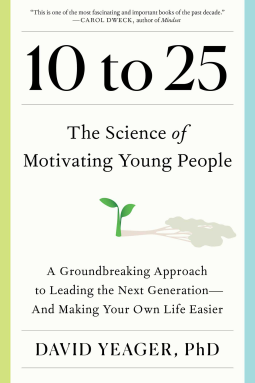
10 to 25
The Science of Motivating Young People: A Groundbreaking Approach to Leading the Next Generation—And Making Your Own Life Easier
by David Yeager
This title was previously available on NetGalley and is now archived.
Send NetGalley books directly to your Kindle or Kindle app
1
To read on a Kindle or Kindle app, please add kindle@netgalley.com as an approved email address to receive files in your Amazon account. Click here for step-by-step instructions.
2
Also find your Kindle email address within your Amazon account, and enter it here.
Pub Date Aug 06 2024 | Archive Date Aug 06 2024
Simon & Schuster Canada | Avid Reader Press / Simon & Schuster
Description
“Ambitious and revelatory...10 to 25 offers baffled adults new approaches—and possibly new hope—during some of their families’ most difficult years.” —The Wall Street Journal
“Required reading for anyone who aspires to be a wise influence on the young people they care about.” —Angela Duckworth
“One of the most fascinating and important books of the past decade...It will change millions of lives.” —Carol Dweck
“This engaging, data-driven book is filled with practical insights.” —Adam Grant
Imagine a world in which Gen Xers, millennials, and boomers interact with young people in ways that leave them feeling inspired, enthusiastic, and ready to contribute—rather than disengaged, outraged, or overwhelmed. That world may be closer than you think. In this book based on cutting edge research, psychologist David Yeager explains how to stop fearing young people’s brains and hormones and start harnessing them.
Neuroscientists have discovered that around age ten, puberty spurs the brain to crave socially rewarding experiences, such as pride, admiration, and respect, and to become highly averse to social pain, such as humiliation or shame. As a result, young people are subtly reading between the lines of everything we say, trying to interpret the hidden implications of our words to find out if we are disrespecting or honoring them. Surprisingly, this sensitivity to status and respect continues into the mid-twenties. 10 to 25 helps adults develop an ear for the difference between the right and wrong way to respect young people and avoid frustrating patterns of miscommunication and conflict.
Yeager explains how to adopt what he terms the mentor mindset, which is a leadership style that’s attuned to young people’s need for status and respect. Anyone can adopt the mentor mindset by following a few highly effective and easy-to-learn practices such as validating young people’s perspectives (rather than dismissing them), asking them questions (rather than telling them what to do), being transparent about your beliefs and goals (rather than assuming that they will accurately guess your thoughts), and holding them to high standards (rather than coddling them). Yeager’s scientific experiments have shown these practices reduce a wide variety of behavior problems, including school dropout, unhealthy eating, stress, purposelessness, mental health problems, and more.
One of the biggest misconceptions about mentoring is that it takes up too much time. On the contrary, those who use the mentor mindset end up with more time. Through back-and-forth conversations, young people feel empowered, and managers can transfer responsibility to them. Young people in this age group are poised to learn, grow, and accomplish incredible things—if only we can tap into the basic neurobiological systems that drive their motivation and behavior.
An essential read for anyone who interacts with young people, 10 to 25 is a groundbreaking book that offers long-term strategies to help nurture well-adjusted, independent, accomplished young people who contribute to society in positive ways—all while making our own lives easier.
Available Editions
| EDITION | Ebook |
| ISBN | 9781668023907 |
| PRICE | $16.99 (USD) |
| PAGES | 320 |



